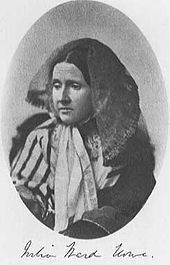 This month, Social activist and abolitionist Julia Ward Howe (1819-1910) and husband Samuel Howe (1801-1876) visit Washington D.C. and have an audience with former Baptist, U.S. President Abraham Lincoln. During their visit to the city, the Howes witness a military review and listen to Company K of the 6th Wisconsin Volunteer sing “John Brown’s Body” to a tune composed in 1856 by William Steffe. Samuel Howe had been a member of a secret group of six supporters who funded the radical abolitionist before the raid at Harper’s Ferry in 1859, and Brown’s subsequent death.
This month, Social activist and abolitionist Julia Ward Howe (1819-1910) and husband Samuel Howe (1801-1876) visit Washington D.C. and have an audience with former Baptist, U.S. President Abraham Lincoln. During their visit to the city, the Howes witness a military review and listen to Company K of the 6th Wisconsin Volunteer sing “John Brown’s Body” to a tune composed in 1856 by William Steffe. Samuel Howe had been a member of a secret group of six supporters who funded the radical abolitionist before the raid at Harper’s Ferry in 1859, and Brown’s subsequent death.
The tune to “John Brown’s Body” was originally a popular campfire spiritual entitled “Canaan’s Happy Shore.” Julia’s pastor, accompanying the family at the military review, suggests that she compose new words for the tune to reflect the rightness of the North in the war effort. Accordingly, today she sits down and writes “The Battle Hymn of the Republic:”
Mine eyes have seen the glory of the coming of the Lord:
He is trampling out the vintage where the grapes of wrath are stored;
He hath loosed the fateful lightning of His terrible swift sword:
His truth is marching on.(Chorus)
Glory, glory, hallelujah!
Glory, glory, hallelujah!
Glory, glory, hallelujah!
His truth is marching on.I have seen Him in the watch-fires of a hundred circling camps,
They have builded Him an altar in the evening dews and damps;
I can read His righteous sentence by the dim and flaring lamps:
His day is marching on.(Chorus)
Glory, glory, hallelujah!
Glory, glory, hallelujah!
Glory, glory, hallelujah!
His day is marching on.I have read a fiery gospelwrit in burnished rows of steel:
“As ye deal with my contemners, so with you my grace shall deal;
Let the Hero, born of woman, crushthe serpent with his heel,
Since God is marching on.”(Chorus)
Glory, glory, hallelujah!
Glory, glory, hallelujah!
Glory, glory, hallelujah!
Since God is marching on.He has sounded forth the trumpet that shall never call retreat;
He is sifting out the hearts of men before His judgment-seat:
Oh, be swift, my soul, to answer Him! be jubilant, my feet!
Our God is marching on.(Chorus)
Glory, glory, hallelujah!
Glory, glory, hallelujah!
Glory, glory, hallelujah!
Our God is marching on.In the beauty of the lilies Christ was born across the sea,
With a glory in His bosom that transfigures you and me:
As He died to make men holy, let us die to make men free,
While God is marching on.(Chorus)
Glory, glory, hallelujah!
Glory, glory, hallelujah!
Glory, glory, hallelujah!
While God is marching on.He is coming like the glory of the morning on the wave,
He is Wisdom to the mighty, He is Succour to the brave,
So the world shall be His footstool, and the soul of Time His slave,
Our God is marching on.(Chorus)
Glory, glory, hallelujah!
Glory, glory, hallelujah!
Glory, glory, hallelujah!
Our God is marching on.
Published in the Atlantic Monthly in February 1862, the hymn becomes a favorite of Federal troops after C. C. McCabe, chaplain of the 122nd Ohio Volunteer Infantry, teaches it to this unit. By the end of the war, the song has emerged as one of the most popular of all Civil War tunes, and to the present remains a popular hymn across denominational lines.
Julia Howe was an Episcopalian-turned-Unitarian, and McCabe a Methodist. Nonetheless, “Battle Hymn of the Republic” became popular with Baptist audiences, while Julia Howe after the war worked hand-in-hand with liberal-minded Baptists in the fight for women’s suffrage. In a letter near the end of her life, Julia noted that Baptist ministers (presumably Northern Baptists) supported her efforts by a ratio of seven to one. Howe’s story represents a snapshot of how Baptists of the North found common cause with other northern Christians during the Civil War, and how one song intended for the Union far outlived its original purposes to become a favored hymn of Baptists and other Protestants throughout America.
Sources: “Julia Ward Howe” (link); “Battle Hymn of the Republic” (link); “A Letter From Julia Ward Howe,” The Outlook, Vol. XVCI, September-December 1910, p. 561 (link)


